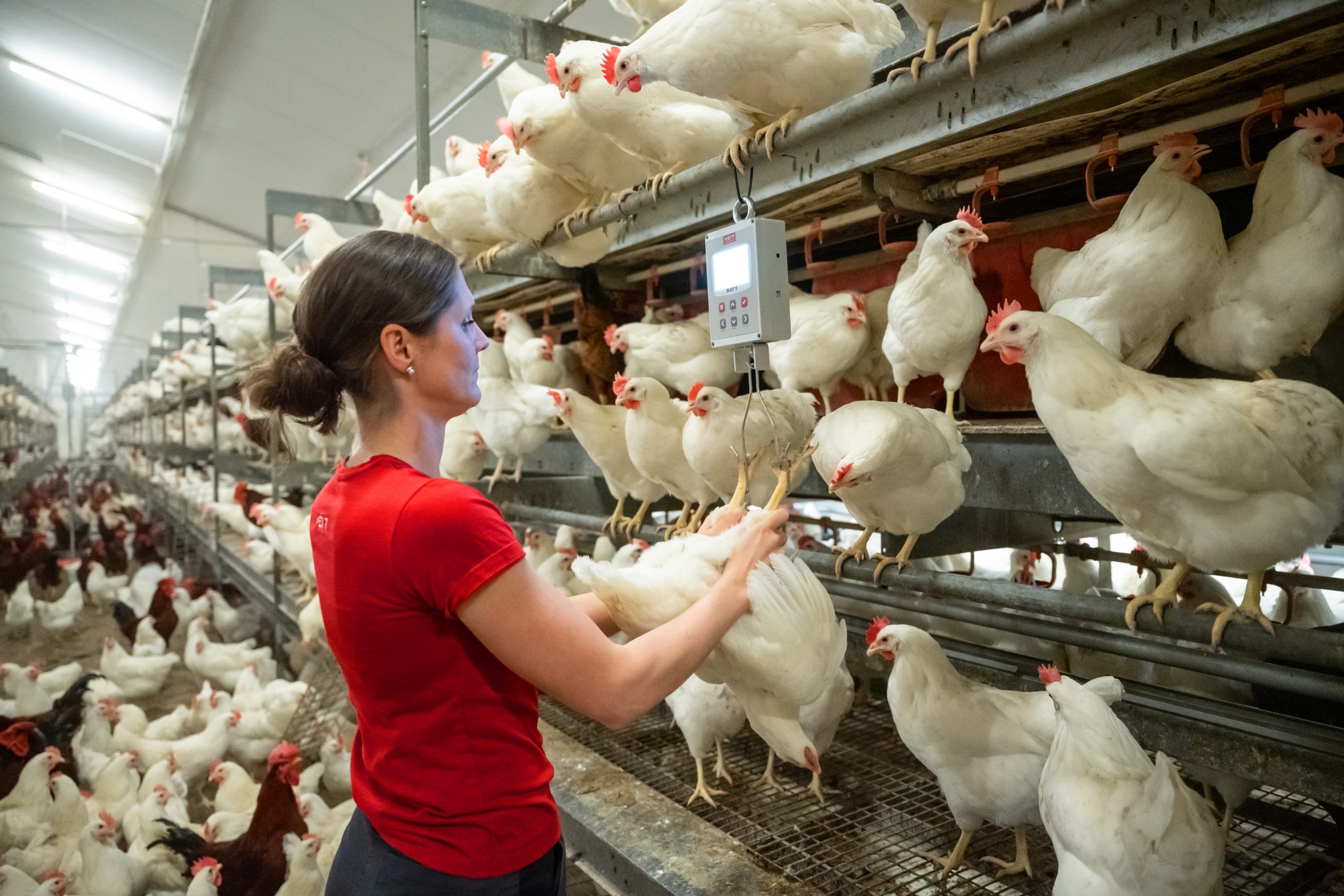Today, dramatic increases in the prices of poultry feed and other expenses are not only raising the prices of poultry industry products, but are also putting downward pressure on margins. All of these factors result in a decline in the production and quality of poultry products and ultimately threaten the very existence of poultry farming companies.
Curbing the impact of rising costs
The key response to these rising costs is to optimise flock management, including feed allocation. Efficient use of feed is dependent on accurate flock monitoring. There are a number of monitoring techniques, the most prominent of which is weight monitoring using reliable equipment and correct processes.
Truly reliable weight data is a vital component to making profitable decisions, as it makes it possible to make the right adjustments in a timely manner and make more accurate predictions regarding flock development.
Reliable data for effective management
In order to breed a flock effectively, it is important to adhere closely to the growth curve defined for the poultry species being bred. To ensure proper flock growth, there are a number of recommendations on how to set up the correct feeding programme and react agilely to deviations that may arise.
The ability to make the right decisions is directly influenced by the relevance of the data. Poor weight data is often to blame for unwanted costs stemming from inefficient use of feed.
Poor data can arise at many points in the weighing process. This can include incorrect weighing intervals,
poor sampling, and human error in the form of fictitious data reporting. The use of unsuitable and unreliable weighing equipment is always a significant problem.

Electronic poultry scales
Electronic scales are the shortest and most reliable route to correct weighing and the resulting savings or increase in profits generated by poultry farming. There are a number of manufacturers on the market supplying scales of varying quality and functionality.
In general, however, electronic scales can be divided into two types: manual and automatic. One example of a long-trusted producer of such scales is VEIT Electronics, with its BAT1 manual scales and its BAT2 automatic scales.
To some extent, electronic manual scales themselves represent a type of automation. Although they require operators, they can often significantly reduce the number of staff needed for the weighing process.
More importantly, the resulting data is trustworthy. This is due to the automatic recording of the results in the scale’s memory. The use of electronic scales as opposed to mechanical scales directly eliminates the risk of poor decisions based on fictitious values.
Unlike manual scales, automatic scales require no operator. This type of scale is permanently located in the house. Weighing takes place continuously or at precisely defined
intervals. The results of weighing with these scales allow a daily overview of the actual development of the flock, as well as a timely, flexible response in managing its growth.
The high-quality flock development data needed to minimise the risk of poor decisions and maximise savings comes from a combination of manual and automatic weighing. In this case, the automatic scales are located in the house during the entire growout.
Depending on the size of the house, multiple weighing points are often advised. Manual weighing is also carried out at regular intervals to verify and refine the collected data. In the case of manual weighing, it is also important to select a weighing sample from different parts of the flock and use a catch pen to separate a part of the flock where each bird is weighed individually.
Improving the economic results
The calculation of specific savings of proper weighing is individual and dependent on the prices of individual inputs including the rising price of feed as well as the specific characteristics of the flock. The growing importance of these savings is a result of, among others, the current crises taking place around the world.
To illustrate, here are some of the benefits that accurate, reliable, and continuous weighing can provide. It allows broiler breeders to accurately predict and effectively regulate growth to meet the requirements of a specific processing company.
Daily data on the condition of flocks of broilers, laying hens, or parents is not only an advantage, but also a requirement for the adequate management of the feeding system and its adjustment based on current growth.
Correct weighing thus makes it possible, from an economic point of view, to determine the optimal amount or composition of feed necessary to achieve defined goals. Last but not least, the knowledge it provides on the health of the flock and the possibility for effective, timely response is also of vital importance.
Conclusion
In these times of significant increases in feed and other costs of poultry breeding, effective feed and farm management represent a clear way to protect and in some cases even increase profit margins. An essential condition for achieving these savings is an excellent overview of flock growth based on reliable data from accurate and, above all, correct weighing.
A key factor in correct weighing is electronic scales that reliably record every bird weight and automatically calculate powerful statistics.
Purchasing and installing a high- quality weighing system as soon as possible can drastically reduce feed expenditure and ensure an even faster return on investment.
